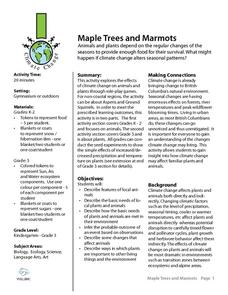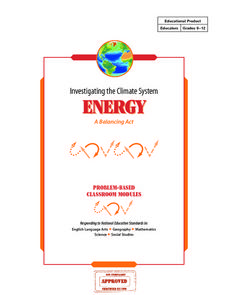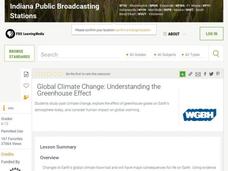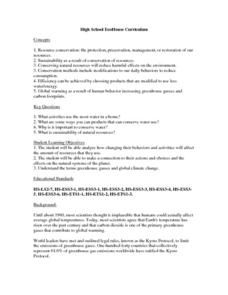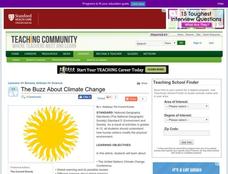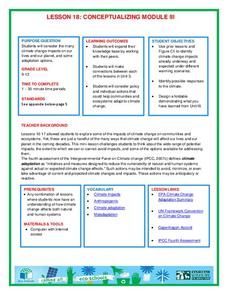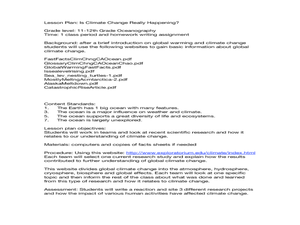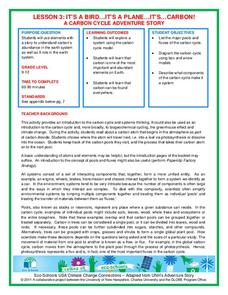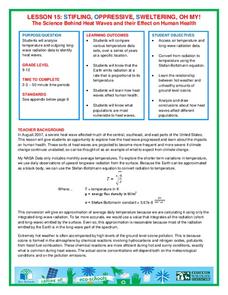Center Science Education
Investigating the Climate
What do graphs of atmospheric gases over time show us? Do they indicate that carbon sources and carbon sinks are not in balance? Up-and-coming meteorologists watch video clips, read information, and analyze data from the HIPPO (HIAPER...
NOAA
Are You Climate Literate?: Play the Essential Principles Challenge
Installment eight of the 10-part Discover Your Changing World series tests the class's understanding of climate. Scholars play alone or in small groups to assess their understanding of climate systems, causes of climate change, and...
Wild BC
Maple Trees and Marmots
Kinesthetic activities simulate animal activity as the seasons progress in a lesson that introduces climate change to primary pupils. The kids role-play maple trees collecting what they need to survive, but as each year comes around, the...
Chicago Botanic Garden
Unit 2 Pre-test, Grades 7– 9
This pre-assessment launches a unit on climate change and weather. 15 questions, both short answer and multiple choice, asses the classes' knowledge about these concepts.
Chicago Botanic Garden
Unit 4 Pre-Assessment
Pre-assessments are great to help teachers determine what information their classes lack, what misconceptions they have, and how in depth to teach specific concepts. The first in a five-part series is a pre-assessment of middle...
Wild BC
Bearly Any Ice
After reviewing food chains, your class members participate in an arctic predator-prey game that exemplifies the impact of climate change of food availability. If you are in a hurry, skip this lesson, but if you have the time to...
Curated OER
The Day After Tomorrow: How is the Density of Water Related to Climate Change and Global Warming?
Science learners simulate what happens when ice breaks up and floats on water and how increased pressure on ice causes it to melt faster. They view a clip from the movie, The Day After Tomorrow, and relate their lab activities to what...
Curated OER
Glaciers: Then and Now
A large data table is given to your elementary earth scientists in which they record observations that they make while viewing pictures of Alaskan glaciers. They compare and contrast recent photos with older photos. Hold a discussion...
National Wildlife Federation
Branching Out – Exploring Dendrochronology
Tree rings from North America give a continuous history of El Nino intensity over the last 1,100 years. Scholars learn how scientists use tree rings to create timelines demonstrating variations in weather patterns. The cumulative...
Wild BC
Greenhouse Gas Line-Up
Discuss different sources of energy and how much greenhouse gas each might emit. The six sources are then ranked according to emissions from greatest to least. Finally, the true cumulative emissions are revealed to show the class how...
Chicago Botanic Garden
Historical Climate Cycles
Scientists use ice core samples to obtain temperatures of the earth from 400,000 years ago! The third of five lessons instructs pupils to interpret historical climate data to see changes over time. In part I, participants interpret...
California Academy of Science
The Heat is On: Cause and Effect and Climate
The higher the number of letters in the final word for the National Spelling Bee, the higher the number of people killed by venomous spiders. Obviously, those two facts correlate, but no causation exists. Scholars view data based on...
Global Change
The Carbon Cycle and its Role in Climate Change
So how does the carbon cycle work? Kids participate in a hands-on activity that allows them to understand the chemistry behind climate change and global warming. They act out the process of photosynthesis by labeling themselves as...
Curated OER
Investigating the Climate System: Energy, A Balancing Act
Earth science explorers design an experiment to demonstrate that the albedo of a surface affects its temperature. They test to find out if moisture on the surface affects temperature. They discover whether or not concrete or asphalt heat...
Curated OER
Climate Change
Students read about climate change and pair share. In this climate change lesson plan, students take notes on a worksheet from the readings. Students each read a part of an article and share what they have learned.
Curated OER
Global Climate Change: Understanding the Greenhouse Effect
Students define the term 'global climate change' and explore how it affects our lives. They research greenhouse gases and identify what events are causing an increase in the amount of greenhouse gases in our atmosphere. Students view...
Curated OER
High School EcoHouse Curriculum
How has the level of carbon dioxide changed over recent years, and what is contributing it? Groups work together to research and present their findings in a creative way. Also built into the instructional activity is a visit to a...
Curated OER
Dr. Climatic
Young scholars examine the principles that are involved in climate change. In this environment instructional activity students view a presentation on climate change and complete a handout.
Curated OER
Climate Change
Students discuss global warming. In this global warming lesson, students read an article about global warming and list five things they learned. Students work in small groups to compare what they wrote. Students illustrate one of the...
National Wildlife Federation
Conceptualizing Module III
Many researchers focus on one impact of climate change in isolation, but researchers gain a global perspective when they come together. A timely lesson teaches scholars about the projected impacts of global temperature increases. Then...
Curated OER
Is Climate Change Really Happening?
Students explore the impact of global warming. In this oceanography instructional activity, students investigate global climate change and write reaction papers about their research findings.
National Wildlife Federation
It's A Bird...It's A Plane...It's...CARBON!
An interesting lesson takes pupils on a trip through the carbon cycle. A reading passage allows scholars to take notes and make choices about what happens to the carbon on its journey. This third lesson in a series of 21 discusses...
National Wildlife Federation
Citizen Science to the Rescue!
You don't have to be a scientist or even out of high school to contribute to scientific research. In the 12th instructional activity in the series of 21, scholars use this opportunity to add to the growing body of scientific knowledge...
National Wildlife Federation
Stifling, Oppressive, Sweltering, Oh My!
Looking for a hot date? Pick any day in August, statistically the hottest month in the United States. The 15th lesson in the series of 21 instructs pupils to investigate the August 2007 heat wave through NASA data, daily temperature...




